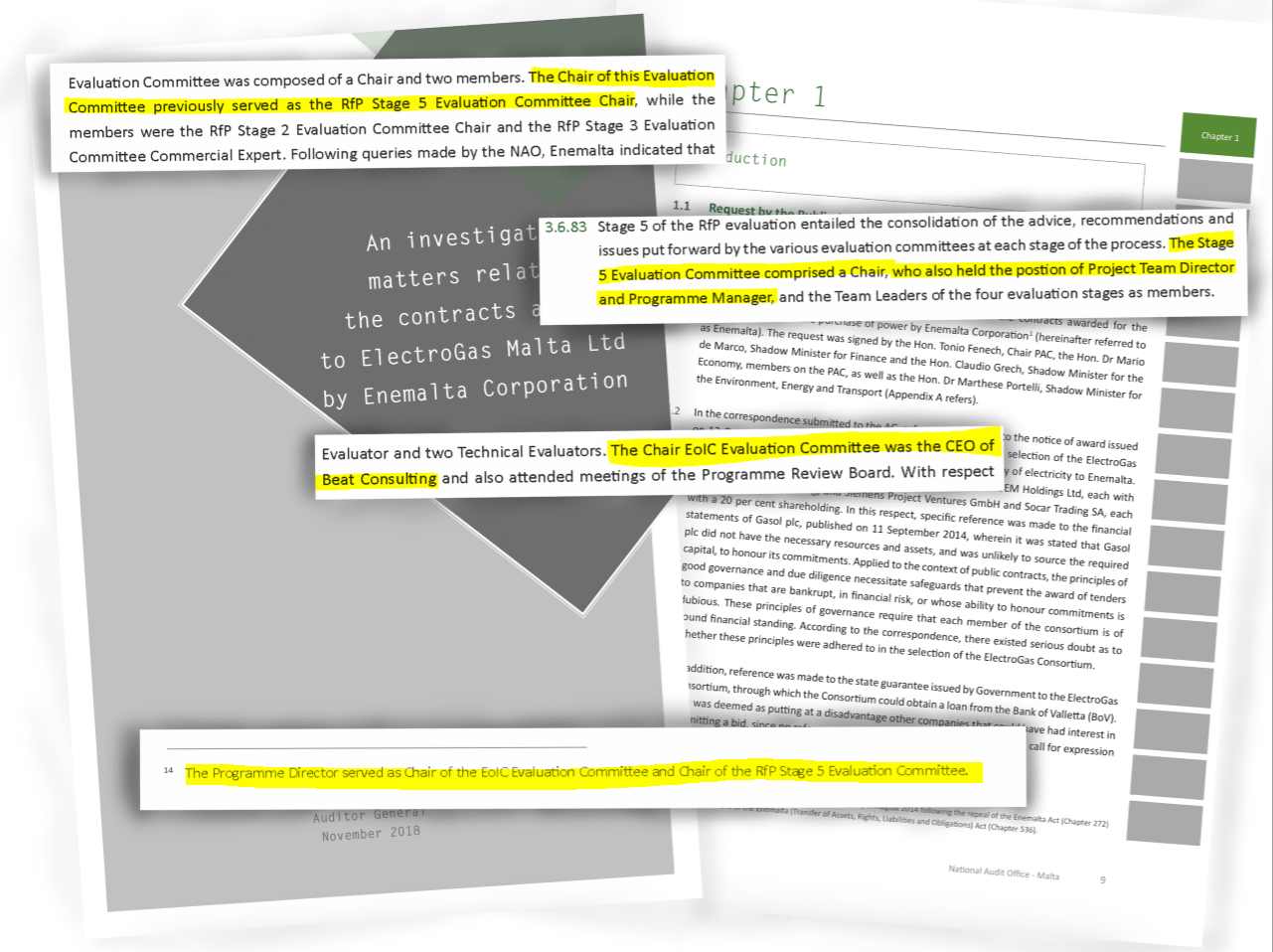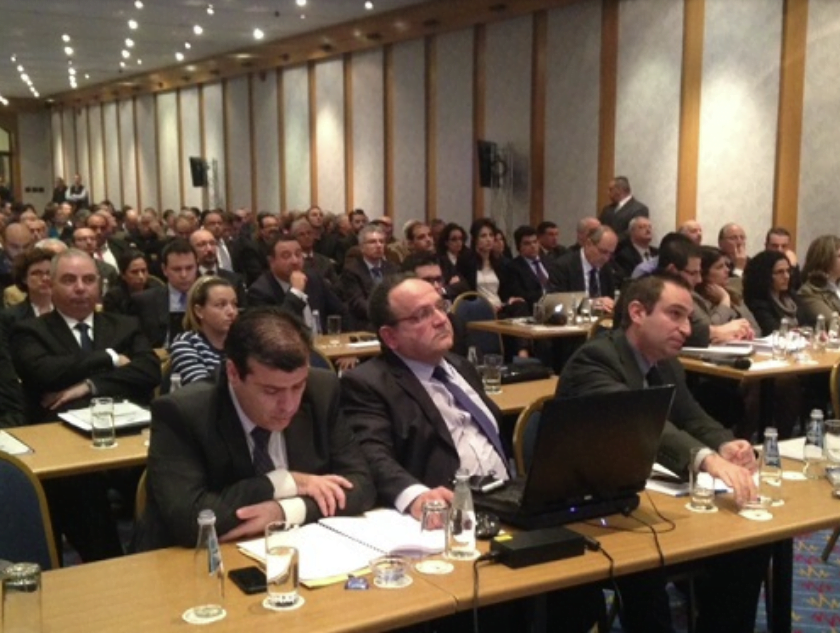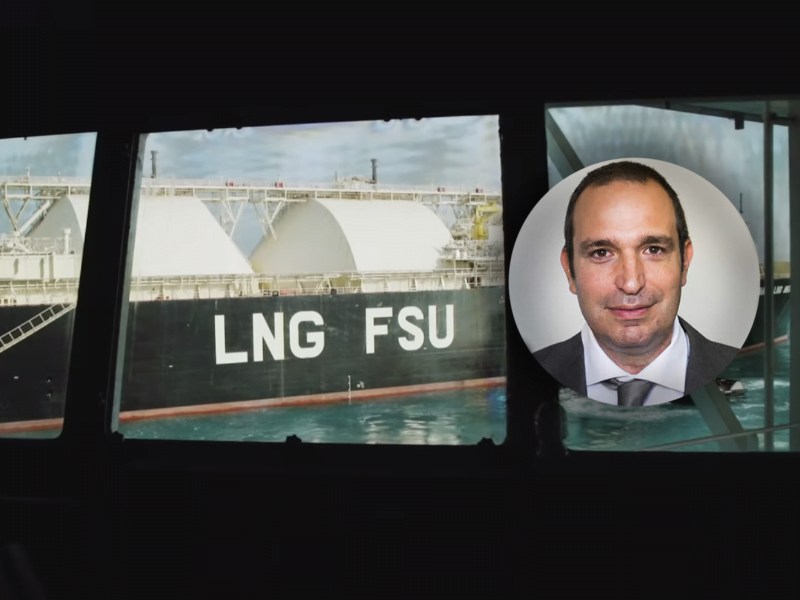A company central to the awarding of the energy deal to Electrogas received a €6,000 direct order from Enemalta to review the findings of the National Audit Office on what is likely to be corruption in that same deal.
The information was revealed in a list of Enemalta direct orders published in the Government Gazette late last month.
Beat Limited (BEAT), previously Beat Consulting, a company with offices in Malta and Dubai, describes itself as a “niche specialist” focusing in the provision of advisory and corporate services to companies in Malta, Dubai and other offshore jurisdictions.

The Direct Order notice
BEAT is majority owned by David Galea, a close associate of Konrad Mizzi, who also acts as the company’s CEO. The other shareholder is Philip A. Tabone, the father of Malta’s consul-general in Dubai, Anthony Tabone.
The possibly deliberate non-communication between Maltese officials, including the consul-general, and Dubai financial authorities is still preventing the progression of Magistrate Charmaine Galea’s inquiry into the corruption and money laundering that has 17 Black, Konrad Mizzi, Keith Schembri and Nexia BT at its nexus.
A deal steeped in corruption and linked to an assassination
Described by international energy market analysts as a deal where Malta is “losing money hand over fist”, the power station sell-off featured in headlines from Azerbaijan to New York as an egregiously corrupt deal potentially linked to journalist Daphne Caruana Galizia’s assassination in 2017.
Yorgen Fenech, the Tumas Group heir charged with conspiring to murder Caruana Galizia, was a director of and is a key shareholder in Electrogas as well as the owner of 17 Black, the Ajman Free Zone-registered kickback company that Caruana Galizia was also investigating.
Following questions in Parliament, the National Audit Office (NAO) published a 600-page report titled ‘An investigation of matters relating to the contracts awarded to Electrogas Malta Ltd by Enemalta Corporation‘ examining the corrupt process through which Electrogas was awarded the €5 billion concession. The findings were damning.
This latest direct order by Enemalta means that BEAT has been appointed to “review” the NAO’s findings, including shortcomings by the company itself and those of its own CEO, David Galea.
BEAT’s involvement in the Electrogas award process
BEAT’s involvement in the Electrogas award process is apparent from the NAO report itself.
The report lists BEAT as receiving €142,525 between 2013 and 2014 in direct orders, presumably from Enemalta, for “programme management” in connection with the award process.

BEAT is listed in the NAO Report as having received several direct orders to “manage” the concession award process.
But BEAT’s involvement in the deal goes much deeper than that.
While much has been said about Nexia BT’s many roles in the Electrogas deal, BEAT’s role in the award process has, to date, been overlooked.
Galea’s name does not feature once in the 600-page report. BEAT is only named twice, with one mention referring to “its CEO”.
A reply to a freedom of information request by the Times of Malta in December 2017 specifically names Galea as “[one of] the persons involved in the various teams of evaluation required in the indicated international process“.
A more detailed review of the NAO report shows that Galea actually occupied four key positions in the evaluation process:
- Chair of the Expression of Interest and Capabilities (EoIC) Evaluation Committee;
- Programme Director who also attended meetings of the Programme Review Board;
- Chair of the RfP Stage 5 Evaluation Committee or the final stage committee; and
- Chair of the Gasol Evaluation Committee.
Galea, in his various roles, is also mentioned by the NAO as the subject of interviews by the NAO for the purposes of preparing the report.
After the award of the concession to Electrogas, Galea continued to occupy a role as ‘Project Director’ to see the Electrogas deal through until its conclusion.

A more detailed review of the report shows Galea occupied multiple roles.
Rigged committees
According to details revealed in the NAO Report, each of these four roles or committees played a key role in ensuring that Electrogas was awarded the lucrative concession.
Described as “central in the high-level management of the project”, the Programme Review Board was a board mainly comprised of Enemalta and Konrad Mizzi’s ministry officials to direct the energy project.
The Programme Review Board’s role was to take key strategic decisions in relation to the award process, mainly based on the conclusions of its committees, until its conclusion.
In his capacity as Programme Director, Galea effectively acted as the Programme Review Board’s chief officer. Galea attended meetings of the Review Board along with Mizzi, presented the criteria to be used by the committees to evaluate submissions, and presented the conclusions of the various committees, including those chaired by himself.
Galea continued to occupy a role, described as ‘Project Director’ or ‘Project Team Director’, in the implementation of the project even after the award to Electrogas and signing of the transaction documents.
The review and award process for the energy deal in 2013 was broken down into several stages. First, Enemalta issued an ‘Expression of Interest’ document setting out high level details of the project. It invited companies to express their interest in bidding for the project with a description of their capabilities.
The Review Board constituted an EoIC Evaluation Committee whose role was to review these indications of interest and narrow them down according to certain criteria. Those shortlisted would then be able to proceed to the next stage, the Request for Proposals (RfP).

Excerpt from Enemalta’s Environmental Impact Assessment in December 2013 (after the award) naming David Galea as Project Director.
Galea chaired this committee along with four other members: two consultants with Dutch energy company DNV KEMA, RSM’s managing partner and an employee of SGS Italia SpA. RSM are the governing Labour Party’s auditors and its managing partner, Thaddeo ‘Deo’ Scerri, was at the time the government’s appointee to the board of Bank of Valletta, which went on to make a massive loan to Electrogas.
Mr Scerri told The Shift that while he was indeed managing partner of RSM during the period mentioned in the NAO report (2013), it was another RSM partner, Maria Micallef, who was on the committee.
The EoIC Evaluation Committee whittled the potential bidders down to six from an initial 18.
Once the bidders were shortlisted, each was invited through the RfP process to submit a more detailed bid. Despite the initial shortlisting to six, only three bids were received by the deadline, one of which was deemed ineligible.
In the end, only the Electrogas Consortium and the Endeavor Consortium’s bids were reviewed.
The review of these bids was divided into five stages, each with their own committee: Stage 1 checked for completeness, Stage 2 checked the bids for adherence to minimum requirements, Stage 3 evaluated the technical, commercial and financial capabilities of bidders, Stage 4 evaluated the bid price and terms submitted by bidders, and Stage 5, the final stage, aggregated the findings of the previous stages including the scores of Stage 3 and 4 and selected the winner.
Galea, as programme director, was appointed as chair of the RfP Stage 5 committee along with Nexia BT managing partner Brian Tonna, as well as a partner from RSM, notary Marco Burlo and Commissioner for Revenue Marvin Gaerty, being the ‘team leaders’ of the prior committees.
Stage 4, the stage that carried 80 per cent of the weighting, was reviewed by a committee exclusively composed of Nexia BT employees including Brian Tonna, who chaired this particular committee.
When at a late stage, despite supposed due diligence as part of the review process, Gasol plc declared bankruptcy and had to sell-off its shareholding in Electrogas, an evaluation committee was cobbled together to review the request and establish whether Electrogas still fulfilled the conditions of the bid following the dropout of Gasol.
The committee was chaired by Galea along with a partner from RSM (the person that acted as Stage 2 team leader or chair) and the head of advisory services at Nexia BT.
This committee effectively rubber-stamped the departure of Gasol, the lead member and 30 per cent shareholder, without impacting Electrogas’s award of the concession.
What did the NAO say?
The NAO report details several shortcomings, key strategic changes and unequal application of criteria throughout the process which, effectively, led to Electrogas winning the concession.
The NAO’s findings also address BEAT and Galea’s various roles in the process.
During EoIC Evaluation Committee stage, the committee chaired by Galea did not question “the [Electrogas] Consortium’s financing capability”, which was 80 per cent borrowed money. This later became an issue when, in order for the deal to progress, the government needed to extend a previously undisclosed “emergency” €360 million guarantee on all loans to Electrogas by international banks.
This committee did flag an element of concern with Gasol’s capabilities – before it declared bankruptcy – but noted that this was mitigated by the fact that each member of the consortium “had the required experience to manage the various elements of the value chain”.

David Galea (front row, first on the right) at the Planning Authority sitting in March 2014 approving the construction of the Electrogas power station. Source: TVM
The NAO’s auditors were worried by the inconsistent approach adopted by the EoIC Evaluation Committee in its assessment of submissions. Potential bidders were excluded on certain grounds while others were allowed to proceed to the RfP despite similar shortcomings.
As Programme Director and chair of the EoIC Evaluation Committee, Galea’s role would have included presenting the findings of this committee and seeking the Review Board’s endorsement. In actual fact, the NAO found that the conclusions of the EoIC Evaluation Committee were notified to potential bidders and the RfP was issued before the Board even endorsed the conclusions.
One of the most heavily criticised aspects of the Electrogas award process related to the lack of due diligence. It is not clear whether Galea was, as Programme Director, involved in the design of the RfP review stages, but part of his role involved explaining the stages and their terms of reference to the Review Board.
Somehow, due diligence was “left out” from these terms of reference, according to the NAO’s findings.
Did Galea have an even wider role?
Although the Stage 5 committee’s role was limited to aggregating the conclusions of the various stages, including awarding a massive 80 per cent weighting to the findings of a committee composed exclusively of Nexia BT employees, it is unclear whether BEAT or Galea were involved in setting this weighting in the first place.
Consultants DNV KEMA were engaged in April 2013 to design the tendering process, feasibility studies EoIC, and the RfP. DNV KEMA reported directly to Konrad Mizzi and a person then described as the “Interim Project Director”, who is not named.
Galea was later appointed as the Project Director.
Read More:
Electrogas: A list of the people who benefit from the corrupt deal
Disinformation #27: Manipulation of the NAO report on the power station deal












